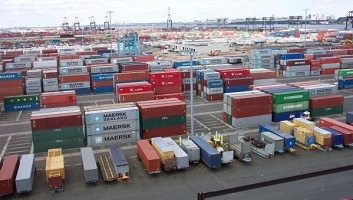Editorial Ports Fraud: Why CTN Deployment Becomes Imperative

Container terminal at Apapa...
Over the years, Nigeria has been battling with issues of corruption in the nation’s ports. As a matter of fact, nearly every stakeholder appears to be involved in one way or the other. It is about malpractices in trade. This starts with the importer and perfected by his freight forwarder, otherwise known as customs agents. First, the importer begins with under-declaration, concealment and under-invoicing. This is targeted at ensuring that he pays less duties other than what would have been the actual duty. In this practice, the importer engages the services of freight forwarder who clears the items involved. However, as the freight forwarder goes to the ports to clear these goods, the personnel of the Nigeria Customs Service discover the antics of the Importer. This is because his declarations as contained in the Bill of Lading are subjected to scrutiny by the Customs personnel. As the goods undergo physical examination at the terminal, it is soon discovered that the importer has cheated the federal government. It is either he under-declared, concealed or under-invoiced his cargo in a bid to pay less duties. With this, the importer is quickly issued Debit Note (DN) by the Customs. But the importer again in order to pay less of what he has been given in the DN, further settles his way among some unscrupulous officers and cheats the government again. If he is lucky, he gets away with this, otherwise, he stands the risk of being stopped by other units of the Customs before he leaves the ports or as he is on his way to the warehouse. He could be stopped by operatives of the Federal Operations Units (FOUs) where he begins another round of settlement.
Similarly, there are other malpractices in trade involving shipping companies bringing goods into the country where the gross registered tonnage (GRT) of vessels is doctored so that the charges to be collected could be less than the actual amount.
It is in view of this spate of trade malpractices leading to revenue loss that the International Cargo Tracking Note (ICTN) has been identified. When deployed in the nation’s ports, it is capable of addressing these issues. ICTN is currently operational in many parts of the world, including West and Central African ports. Although, it was opposed in the past by freight forwarders who saw it as coming with additional charges, indications are that Nigerian Shippers’ Council (NSC) which is to implement the system has the capacity to manage it in such a way that it will not add to the costs importers suffer at the ports. Already, the NSC has given the second quarter of this year as the date for the implementation of ICTN in Nigerian ports, yet, many are still skeptical if this will be real given the fact that it was not the first time the agency made such promise. Sources revealed that there have been moves to scuttle the ICTN deployment in Nigerian ports.
It is in view of this that SHIPPING DAY calls on the federal government to consider as a matter of urgency to intervene in ensuring that ICTN is deployed in Nigerian ports as promised by the NSC. ICTN is a weapon against issues of insecurity and all manner of trade malpractices in the ports. It is considered as a regulatory tool for the NSC as ports economic regulator. So, there cannot be a better time for introducing it than now.
FOLLOW US
